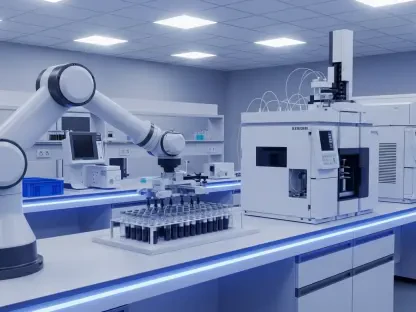Cancer clinical trials have long been underutilized in the medical community despite their critical role in shaping future treatments. In a time when breakthrough therapies could significantly alter the course of disease management, actor Rob Lowe has emerged as a passionate advocate for boosting participation in these trials, focusing intently on breast cancer. This mission is deeply personal for Lowe, as three generations of women in his family have suffered from breast cancer, providing him with first-hand insight into the devastating impacts of the disease. Driven by his family’s history, Lowe is determined to enhance public understanding of the importance of clinical trials and the profound effects they have on cancer care.
A Personal Motivation for Public Advocacy
Lowe’s Family History: A Driving Force
Rob Lowe’s commitment to championing cancer clinical trials is profoundly rooted in his family’s experiences. His grandmother, known affectionately as Mim, was a central figure in his childhood, sparking his love for literature by reading him tales such as “Peter Rabbit.” During her battle with breast cancer, Mim became a participant in two clinical trials, which, despite the era’s bleak outlook, significantly extended her life. Her journey showed Lowe the transformative power of clinical trials, turning a grim prognosis into extended years filled with cherished memories. Conversely, Lowe’s mother also faced breast cancer but experienced a drastically improved standard of care thanks to the advancements from successful trials during the intervening years. This evolution in treatment from one generation to the next underscores the significant contributions that clinical trials make to medical science.
Expanding Awareness and Understanding
While only about 7% of cancer patients in the United States currently participate in clinical trials, Lowe’s mission seeks to increase this number by highlighting the tangible benefits trials offer. By collaborating with pharmaceutical companies like Eli Lilly, he aims to dismantle misconceptions and highlight the critical role these trials play in developing new therapies. Understanding that clinical trials are the bedrock for tomorrow’s medical breakthroughs, Lowe advocates for increased patient engagement, emphasizing the opportunity to access cutting-edge treatments that would otherwise remain unavailable. Every participant in a trial not only receives potentially life-saving care but also becomes a part of the larger narrative advancing medical progress.
The Science and Benefits Behind Clinical Trials
Opportunities for Groundbreaking Research
Clinical trials serve as the testing grounds for pioneering treatments that could redefine cancer care. For instance, a promising breast cancer vaccine, currently under trial, leverages the immune system to recognize and attack cancer cells preemptively. This approach marks a significant shift, targeting cancerous cells before they transform into life-threatening tumors. Such innovative treatments, often accessible only within a trial setting, provide patients with new hope and pathways toward recovery while contributing to the broader medical knowledge pool. The success of these trials can lead to standard care practices, fundamentally altering future treatment landscapes and improving outcomes for countless patients.
Understanding Barriers to Participation
Despite the promising nature of clinical trials, numerous barriers continue to hinder participation. Mistrust in the medical system, logistical challenges such as travel distances to trial sites, insufficient health coverage, language obstacles, and fears relating to immigration status all contribute to low engagement rates. Overcoming these hurdles is essential for maximizing the potential reach and benefits of clinical trials. Initiatives aimed at addressing these barriers include educating communities about the importance of trials, enhancing accessibility through telemedicine, and providing support for logistical needs. By broadening trial participation, the medical community can accelerate the development of new therapies and improve treatment accessibility across diverse populations.
Navigating the Long Road to Approval
The Rigorous Path to Public Availability
The journey from a clinical trial’s inception to the public availability of a new treatment typically involves several years of rigorous testing and review. Before any new drug or procedure receives FDA approval, it must pass through numerous phases of clinical trials, each designed to assess its safety, efficacy, and potential side effects. This thorough process ensures that only the most promising and safe treatments ultimately make it to market. These trials play a pivotal role, offering a controlled environment to gather comprehensive data and insights on emerging medical innovations. Thus, clinical trials are indispensable for establishing new medical standards and ensuring that advancements are safely and effectively integrated into patient care.
Encouraging Dialogue and Awareness
In addition to addressing logistical barriers, encouraging open dialogue between patients and healthcare providers about clinical trial options is crucial. Discussing available trials with medical professionals empowers patients to make informed decisions about their treatment pathways. Lowe emphasizes the significance of this dialogue, framing it as a vital part of the treatment journey. For patients, understanding their options within the scope of clinical trials can redefine their treatment experience, providing both immediate benefits from cutting-edge therapies and long-term improvements in overall cancer care. By fostering an environment of transparency and education, healthcare systems can bridge the gap between existing patient care and the potential of clinical trials.
Envisioning a Future Transformed by Participation
Fostering Hope and Resilience
Despite the inherent challenges in expanding clinical trial participation, Rob Lowe remains hopeful, driven by his family’s experiences and the broader potential for medical breakthroughs. His activism underscores the transformative power of embracing clinical research as a key component of cancer treatment. By investing in personal advocacy and actively engaging in current trials, patients not only contribute to advances in medicine but also potentially gain access to life-extending treatments. Lowe’s message is clear: understanding one’s family health history, seeking genetic testing, and actively participating in clinical trials can significantly influence patient outcomes and pave the way for future medical achievements.
Addressing Misconceptions and Strengthening Advocacy
Among the common misconceptions is the fear of receiving a placebo instead of active treatment in cancer trials. Lowe clarifies that, in cancer-related clinical trials, patients always receive the standard of care. Any investigational treatment offered is in addition to this baseline care, emphasizing the safety and potential advantages of participating. His involvement with Eli Lilly and other healthcare initiatives illustrates his dedication to patient advocacy, offering a relatable narrative of hope and resilience to those navigating similar journeys. This combined commitment to highlighting breakthroughs and sharing real-world stories can inspire broader community engagement and foster a climate of proactive health management.
A Collective Commitment to Future Healthcare
Cancer clinical trials, essential for developing future treatments, have been historically underutilized within the medical community. In an era where groundbreaking therapies can profoundly transform disease management, actor Rob Lowe has become a strong proponent for increasing participation, especially in breast cancer trials. Lowe’s commitment to this cause is deeply personal; his family has been tragically affected by breast cancer over three generations, which has given him intimate knowledge of its devastating effects. Motivated by his family’s experiences, Lowe is driven to educate the public on the vital role clinical trials play in advancing cancer care. He seeks to dispel myths and highlight the significant contributions these trials can offer to the development of new treatments. By leveraging his public platform, Lowe aims to raise awareness among people, encouraging them to view trials not just as experimental processes but as opportunities to drive progress and save lives in the cancer fight.









